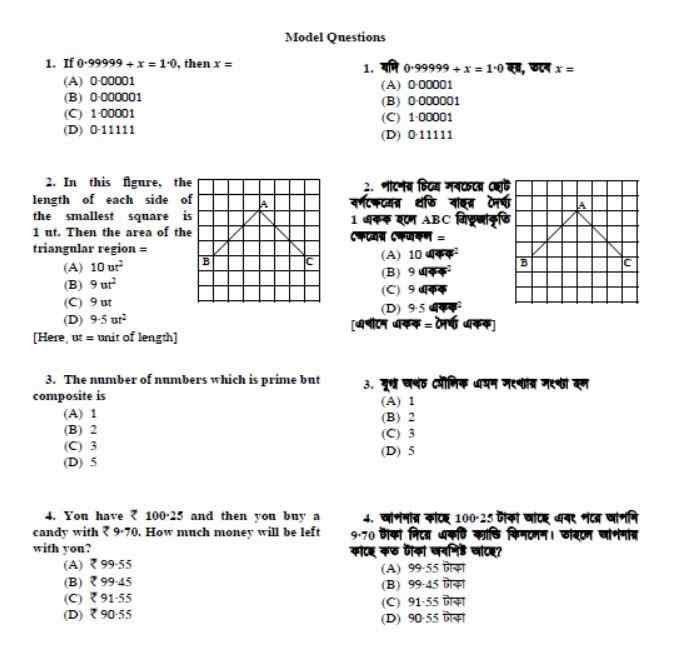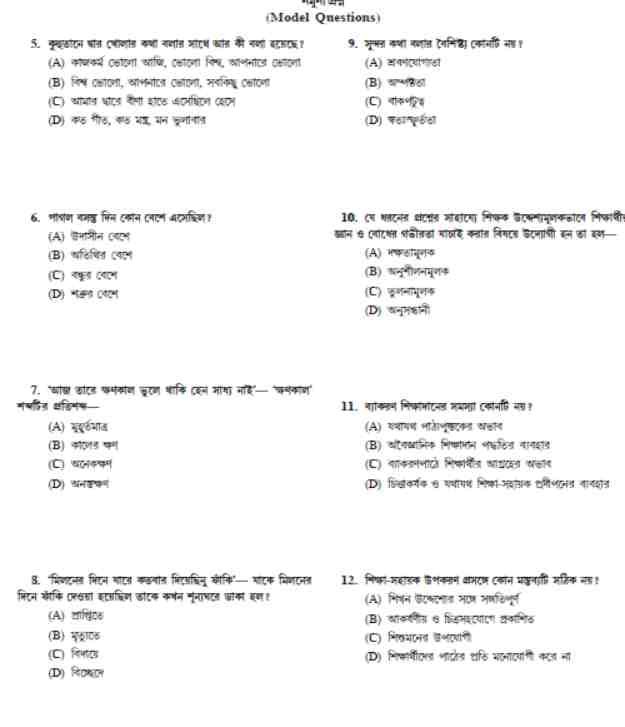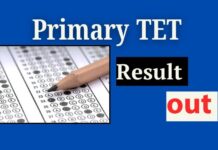This Post Contents
Official WB Primary TET 2022 Syllabus – From here you can( Official WB Primary TET 2022 Syllabus) Download West Bengal primary tet syllabus in PDF format.Just now Official West Bengal primary tet syllabus pdf download link are published by WBBPE.The entire test will be based on Multiple Choice Questions, MCQs (each carrying 1(one) mark) with four alternatives out of which one answer will be correct as per the following distribution. In every paper Pedagogical portion is 15 numbers.Here we discuss Official WB Primary TET 2022 Syllabus.Below you find “West Bengal primary tet syllabus pdf download” link.
- Child Development and Pedagogy- No. of MCQs-30,Marks-30
- Language I (Bengali/Hindi/Oriya/Telugu/Nepali/Santhali/Urdu) -No. of MCQs-30,Marks-30
- Language II (English)-No. of MCQs-30,Marks-30
- Mathematics-No. of MCQs-30,Marks-30
- Environmental Studies-No. of MCQs-30,Marks-30
যদি এই সিলেবাসটি বাংলায় ডাউনলোড করতে চান তাহলে এখানে ক্লিক করুন
West Bengal primary tet syllabus pdf download-Official WB Primary TET 2022 Syllabus
There will be no negative marking.The question paper will be bilingual (Bengali & English),Duration of the examination : 150 minutes (2:30 Hrs.).
Qualifying Marks : A candidate, who scores 60% or above out of the full marks (150) in the TET, will be considered as TET-2022 passed candidate. A relaxation by 5% (i.e. 55% or above) will be the qualifying mark for SC,ST, OBC-A, OBC-B, PH, EC, Ex-Servicemen and DH (Death-in-harness) candidates. However, qualifying the TET-2022 would not confer the right on any person for recruitment/ employment as it is only one of the eligibility criteria for appointment.
Validity Period of WB Primary TET-2022 Certificate
The validity period of TET qualifying certificate for appointment will be for lifetime for all categories. There is no restriction on the number of attempts a candidate can take part for acquiring a TET certificate. A candidate who has qualified TET-2022 may appear again in the future TET exams, if she/he so desires to improve her/his score.
Official WB Primary TET 2022 Syllabus

Nature and standard of questions Primary TET 2022 Questions
candidates are advise go through this Official WB Primary TET 2022 Syllabus.You also find a direct link to download this syllabus below.
- The test items on Child Development and Pedagogy will focus on educational psychology of teaching and learning relevant to the age group of 6-11 years. They will focus on understanding the characteristics and needs of diverse learners, interaction with learners and the attributes and qualities of a good facilitator of learning.
- The Test items for Language I will focus on the proficiencies related to the medium of instruction, (as chosen from list of prescribed language options in the application form).
- Language II will be from among the prescribed option other than Language I. A candidate may choose any one language from the available language options and will be required to specify the same in the application form. The test items in Language II will also focus on the elements of language, communication and comprehension abilities.
- The questions in the tests for Paper I will be based on the topics of the prescribed syllabus of the State for classes I-V, but their difficulty standard, as well as linkages, could be up to the secondary stage.
Official WB Primary TET 2022 Syllabus
Part-A : Child Development and Pedagogy
(a) Child Development
- Concept and principles of development,growth and maturation, difference between growth and
- development, relationship of development with learning
- Heredity & Environment as factors of development
- Socialization processes: Social world & children (Teachers, Parents, Peers)
- The important period of lifespan after Arnest James and Rousseau; physical, psychological and
- social development according to each period of lifespan.
- Physical, Social, Emotional, Language and Cognitive development; Views of Piaget, Kohlberg
- and Vygotsky
- Personality : meaning, nature and theories (Freud, Erickson)
- Intelligence-meaning, nature and theories (Spearman, Thorndike, Guilford, Gardner, Sternberg)
- and their implications
- Individual differences among learners and its educational implications in teaching learning process
(b) Concept of Inclusive education and understanding children with special needs
• Addressing learners from diverse backgrounds including disadvantaged and deprived groups
• Addressing the needs of children with learning difficulties (physical, sensory, developmental
and behavioural or emotional) types of learning disabilities (dyscalculia, dysgraphia, dyslexia,
nonverbal learning disabilities).
• Addressing the Talented, Creative, Differently abled Learners, Learners with SLD
• Gender as a social construct; gender roles, gender-bias and educational practices
(c) L earning and Pedagogy
• Learning-meaning; nature; theories (Pavlov, Skinner, Thorndike, Gestalt) and their implications.
• Concepts of child-centred, learner-centred and progressive education
• Teaching-meaning, nature, phases of teaching, levels of teaching
• Constructivism: nature, principles, types and 5E model
• Motivation and learning-Maslow’s theory, Achievement motivation
• Methods of teaching based on Lecture, Demonstration, Discussion, Discovery, Heuristic, Inductive,
Deductive, Project and Problem solving
• Bloom’s taxonomy of instructional objectives and learning outcomes
• Microteaching and Teaching skills
• Formative and Summative evaluation; Assessment for learning and Assessment of learning;
School-Based Assessment, Continuous & Comprehensive Evaluation, Diagnostic test
• Formulating appropriate questions for assessing learners, for enhancing learning and critical
thinking in the classroom and for assessing learner’s achievement.
Which one of the following is NOT a maxim
of teaching?
(a) Known to unknown
(b) Deduction to induction
(c) Particular to general
(d) Psychological to logical‘Development is a never ending process’.
This idea is related to
(a) Principles of inter-relation
(b) Principles of interaction
(c) Principles of individual difference
(d) Principles of continuity
Part-C : Language – II (English)
(a) Comprehension: 15 Questions
Two unseen prose passages (discursive, literary, narrative, scientific) with questions on comprehension,
grammar and vocabulary.
(b) Pedagogy of Language Development: 15 Questions
• Learning and acquisition.
• Principles of language teaching
• Role of listening and speaking; function of language and how children use it as a tool.
• Critical perspective on the role of grammar in learning a language for communicating ideas verbally
and in written form.
• Challenges of teaching language in a diverse classroom; language difficulties, errors and disorders.
• Language Skills.
• Approaches, Methods and Techniques of Teaching English.
• Evaluating language comprehension and proficiency: speaking, listening, reading and writing.
• Teaching Learning Materials (TLM): Textbook, multi-media, multi-lingual resources to be used in
classroom teaching.
• Remedial Teaching.
Model Questions:
Read the following passage to answer the Q Nos. 1 to 4:
Self-directed learning, in its broadest meaning, describes a process in which individuals take the
initiative with or without the help of others, in diagnosing their learning needs, formulation of learning
goals, identifying resources for learning, choosing and implementing learning strategies and evaluating
learning outcomes. Thus, it is important to attain new knowledge easily and skillfully for the rest of his
or her life.
What is the need for self-directed learning? One reason is that there is convincing evidence that
people, who take the initiative in learning, learn more things and learn better than people waiting to be
taught. The second reason is that self-directed learning is more in tune with our natural processes of
psychological development. An essential aspect of maturing is developing the ability to take increasing
responsibility of our own lives to become increasingly self-directed. The third reason is that many of
the new developments in education impart a heavy responsibility on the learners to take a good deal of
initiative in their own learning. To meet the challenges in today’s instructive environment, self-directed
learning is most essential.
- Self-directed learning means:
(A) learning with or without the help of others
(B) passive learning
(C) learning by direction from others
(D) self learning of the aspirant - Which word best describes self-directed learning?
(A) Repulsive learning
(B) Compulsory learning
(C) Active learning
(D) Passive learning - There is need for self-directed learning because
(A) it is less challenging
(B) it helps people to learn more things and learn better
(C) it is a costly method
(D) it is directed by others - The modern environment, according to the author is
(A) instructive
(B) restrictive
(C) impracticable
(D) less developed - Use of grammar, punctuation and spelling pertains to
(A) text production while writing.
(B) thermal speech.
(C) listening to a lecture.
(D) informal conversation. - In response to a student’s question in the class room a teacher should
(A) advise the student to meet him/her after the class.
(B) encourage the student to participate in the classroom discussion.
(C) encourage the student to ask more questions.
(D) encourage the student to search answers independently. - Mistakes in language learning should be
(A) taken seriously
(B) eliminated as early as possible
(C) ignored
(D) discussed with parents
Part-D : Mathematics
(a) Content: 15 Questions
(1) Geometry (2) Shapes (3) Numbers (4) Addition & Subtraction (5) Multiplication
(6) Division – Division Algorithm (7) Area & Perimeter (8) Time (9) Patterns (10) Money
(b) Pedagogical Issues 15 Questions
- Nature, characteristics and theoretical aspects of Mathematics education.
- Aims and objectives of teaching Mathematics at primary stage.
- Relevant curriculum and resource in Mathematics learning.
- Mathematics teacher and teaching learning methods and approaches.
- Pedagogic content knowledge.
- Planning for teaching Mathematics.
- Evaluation of Mathematics learning.
- Mathematical problems based on deep concept to justify the teaching ability based on application
concerning pedagogical issues.
Part-E : Environmental Studies
(a) Content 15 Questions
• Physical and Social Environment
• Geographical location of India and West Bengal and their environment
• Environment related historical events
• Food, Shelter, Clothes, Travel
• Ecology and ecosystem, food chain
• Atmosphere, land, water
• Environmental pollution
• Plants, animals, biodiversity
• Natural resources
• Family and Friends
• Waste and waste management
• Global environmental issues
• Environment and health
• Human skill and endeavour
(b) Pedagogical Issues 15 Questions
• Concept and scope of EVS
• Significance of EVS, integrated EVS
• Environmental Studies & Environmental Education
• Learning principles
• Scope and relation to Science and Social Science
• Approaches of presenting concepts, activities; Lesson plan/design
• Observation, Data Collection, Experimentation/Practical work
• Discussion, Explanation, Drawing inference, Judgement and justification
• CCE
• Teaching learning materials/aids
• Problem solving and Reflective teaching practices in EVS
• Scope of ICT in teaching EVS
West Bengal primary tet syllabus pdf download

FAQs
Is there any negative marking in WB Primary TET 2022 Exam?
NO, There will be no negative marking
Is primary TET 2022 Question papers is bilingual?
Yes,The question paper will be bilingual (Bengali & English).
Where i find Official WB Primary TET 2022 Syllabus ?
here you can find Official WB Primary TET 2022 Syllabus .
West Bengal primary tet syllabus PDF download?
Here you get direct link to download Official WB Primary TET 2022 Syllabus






thanks for info